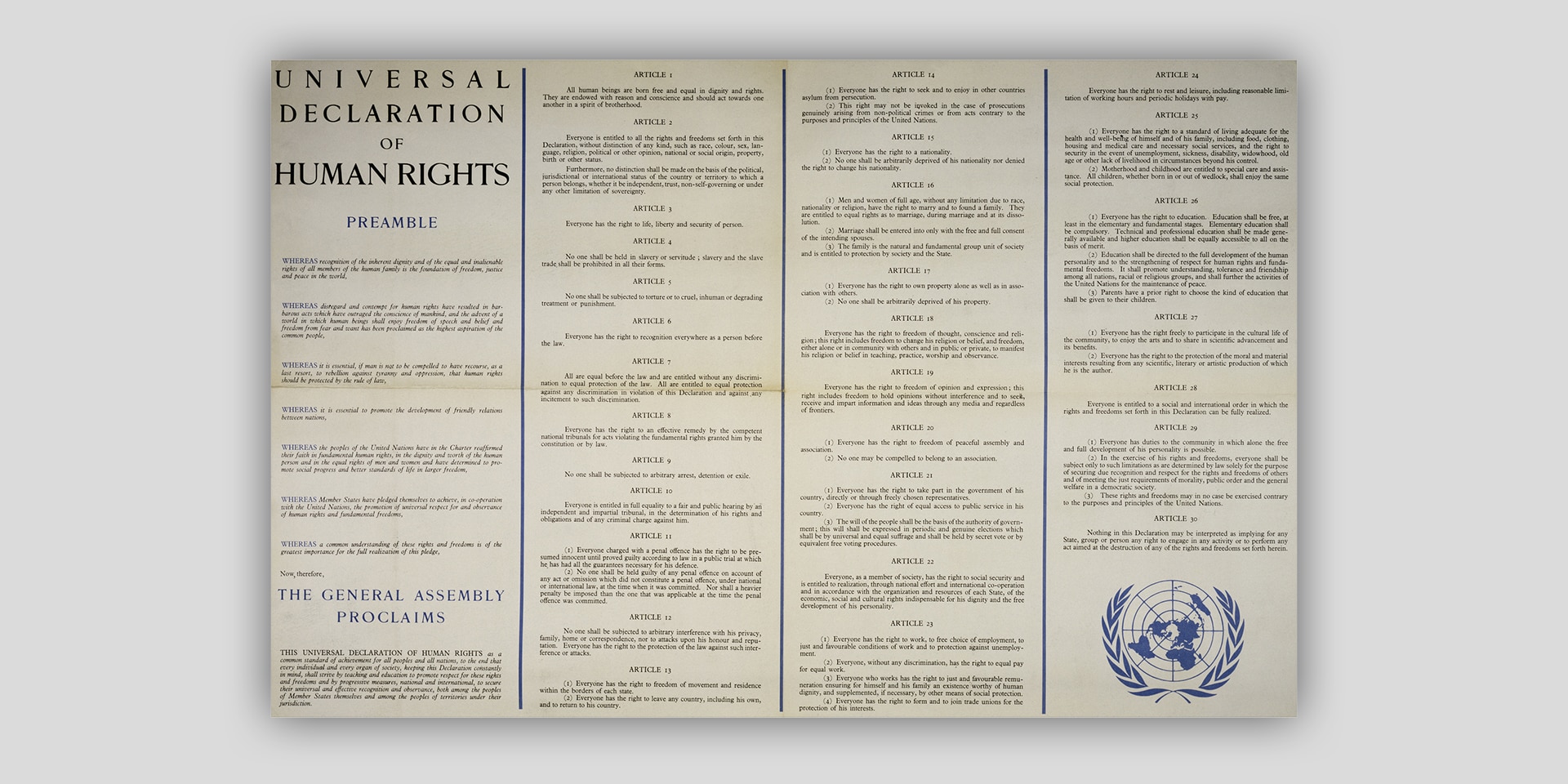Universal Declaration of Human Rights: still relevant, still pointing the way forward after 75 years
75 years ago, amidst the rubble of the Second World War, the UN's founding states signed the Universal Declaration of Human Rights. Building on the declaration, Switzerland is firmly committed to the universal protection of human rights, particularly in the areas of freedom of expression, the death penalty, torture, minorities and women's rights.

The Universal Declaration of Human Rights was adopted by the UN General Assembly on 10 December 1948. It has lost none of its relevance to this day. © Keystone
To mark the 75th anniversary of the Universal Declaration of Human Rights, the UN in Geneva and Switzerland are hosting a two-day high-level event in Geneva on 11 and 12 December 2023. Further information is available at Human Rights 75 high-level event.
The international community made history in the wake of the horrors of the Second World War by adopting the Universal Declaration of Human Rights in 1948. The declaration stated that the "recognition of the inherent dignity and of the equal and inalienable rights of all members of the human family is the foundation of freedom, justice and peace in the world". The Universal Declaration of Human Rights has been translated into over 500 languages to date, making it universal in a special sense: it is the world's most translated document.
No democracy without human rights – in Switzerland too
Switzerland was not yet a member of the UN when the General Assembly adopted the Universal Declaration of Human Rights in 1948. Nevertheless, the declaration's content has underpinned Switzerland's commitment to human rights for decades; all legally binding international human rights agreements that Switzerland has signed are grounded in the declaration. The realisation that there can be no sustainable peace, security or development without the protection of human rights is also central to our country's values and experience: fundamental rights are the foundation of our participatory democracy. Respect between majorities and minorities with different religious, linguistic and cultural backgrounds is one of Switzerland's distinctive characteristics. The protection of individual rights, democracy and the rule of law depend on and strengthen each other.
As part of its foreign policy, Switzerland promotes respect for human rights, as stipulated in Article 54, paragraph 2 of the Federal Constitution.
Switzerland's key role in the defence of human rights
The FDFA is charged with carrying out the constitutional mandate to promote respect for human rights and democracy around the world. The FDFA's Peace and Human Rights Division (PHRD) plays a leading role here, pursuing this work through various initiatives. It focuses in particular on freedom of expression, the abolition of the death penalty, the ban on torture, the protection of minorities and women's rights. One example of its minorities-focused work is its cooperation with the Organization for Security and Co-operation in Europe (OSCE) to promote multilingual education in Georgia, the kind of initiative that strengthens inclusive societies as well as regional stability in the long run. Switzerland's engagement for minorities and particularly vulnerable groups is grounded in the conviction that protecting minorities is key to conflict prevention. The core of work to protect minorities is the principle of equality before the law – a principle that is not only a crucial part of Switzerland's constitutional order but also anchored in the first article of the Universal Declaration of Human Rights, which states that "all human beings are born free and equal in dignity and rights".
Human rights for the challenges of today and tomorrow
Nevertheless, today's world is still plagued by recurring atrocities, a blatant disregard for human dignity, and grave breaches of human rights. Warfare has engulfed Europe and the Middle East, and across the globe the number of violent conflicts and confrontations is on the rise.
"Human rights are inadequately implemented and systematically violated in many places. But this is precisely why it is now all the more important to remain steadfast and stand up firmly for the foundations of our peaceful coexistence," says FDFA State Secretary Alexandre Fasel, stressing that "we shouldn't forget the major progress made over the last 75 years in prosecuting serious human rights violations through newly established institutions such as the special tribunals and the International Criminal Court."
New technologies such as artificial intelligence can help protect human rights more efficiently, but also harbour the risk of rights violations. That is why the Geneva Science and Diplomacy Anticipator (GESDA), supported by the Swiss Confederation, is committed to anticipating scientific advances and making sure they can benefit everyone. GESDA's vision refers explicitly to the Universal Declaration of Human Rights (Article 27 – "Everyone has the right to share in scientific advancement and its benefits") in its goal of helping the world's population to benefit faster from scientific and technological progress.
Human rights are better protected today than they were yesterday. "Let us take this anniversary of the Universal Declaration of Human Rights as an opportunity to revive the consensus of 1948 so as to protect human rights even better tomorrow than we do today," says Mr Fasel.
